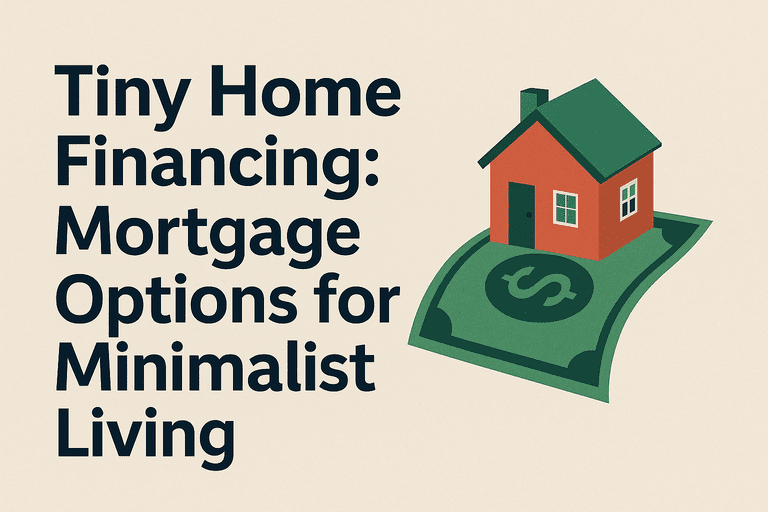As the minimalist movement gains momentum, more people are exploring tiny homes as a practical and affordable housing option. These compact living spaces offer flexibility, reduced utility costs, and an environmentally conscious lifestyle. However, financing a tiny home can be more complex than traditional housing due to their unique size and classification. Understanding your tiny home mortgage options, including small house loans and alternative housing financing, is crucial for making a sound investment.
Understanding Tiny Home Mortgages
A tiny home mortgage is a financing solution tailored to small, non-traditional housing units. Unlike standard mortgages, tiny homes often fall under special categories:
Manufactured or modular homes – Some lenders classify tiny homes as manufactured housing, enabling FHA or VA loan eligibility.
Land-based homes – If the tiny home is permanently attached to land, it may qualify for a conventional mortgage.
Mobile tiny homes – For portable units, financing may involve personal loans or RV-specific loan products.
These loans provide the capital needed to purchase or build a tiny home, with repayment terms that reflect the home’s size and value.
Small House Loan Options
Several loan types cater to tiny home buyers:
1. FHA Loans for Tiny Homes
The Federal Housing Administration (FHA) offers loans for homes that meet minimum size and foundation requirements. Benefits include:
Low down payment requirements
Flexible credit score thresholds
Government-backed loan security
2. VA Loans for Veterans
Qualified veterans can access VA loans for tiny homes, provided the home is on a permanent foundation. Advantages include:
Zero down payment
Competitive interest rates
No private mortgage insurance (PMI)
3. Conventional Small House Loans
Some lenders offer conventional mortgages for small homes, typically requiring:
A standard credit score (usually 620+)
Proof of income and employment
A minimum home appraisal value
4. Alternative Housing Financing
For tiny homes that are mobile or off-grid, options include:
Personal loans or secured loans
RV or manufactured home financing
Crowdfunding or community-backed financing
These alternative financing solutions make tiny home ownership accessible even without traditional mortgage approval.
Benefits of Tiny Home Financing
Financing a tiny home can provide several advantages:
1. Lower Monthly Payments
Tiny homes typically cost significantly less than conventional houses, resulting in smaller mortgage or loan payments.
2. Reduced Living Costs
Smaller spaces mean lower utility bills, less maintenance, and lower property taxes.
3. Flexibility and Mobility
Depending on whether the home is mobile, financing may allow for relocation or temporary living solutions.
4. Eco-Friendly Lifestyle
Tiny homes often incorporate energy-efficient appliances and sustainable building materials, supporting environmental sustainability.
Qualifying for a Tiny Home Mortgage
Eligibility for tiny home financing depends on several factors:
Creditworthiness – Lenders will assess your credit score, income, and debt-to-income ratio.
Home Classification – Whether the home is considered real property, personal property, or mobile affects the loan type.
Down Payment – Depending on the loan program, down payments can range from 0% to 20%.
Appraisal and Inspection – Lenders may require inspections to confirm safety and livability standards.
Working with a lender familiar with tiny homes is essential to navigate the various requirements.
Tips for Securing the Right Tiny Home Loan
Compare Loan Programs – Research FHA, VA, conventional, and personal loan options.
Evaluate Costs vs. Benefits – Consider total costs including interest, insurance, and taxes.
Confirm Property Status – Ensure your tiny home meets lender requirements for permanent or mobile homes.
Seek Professional Advice – Mortgage brokers or financial advisors specializing in alternative housing can help you find the best terms.
Plan for Upgrades – Factor in potential improvements like solar panels or energy-efficient systems that can add value.
Conclusion: Tiny Homes as a Viable Housing Option
A tiny home mortgage offers a path for individuals seeking minimalist living, financial flexibility, and environmental responsibility. By exploring small house loans or alternative housing financing, prospective homeowners can secure affordable, practical solutions for owning or building a tiny home. Proper research, professional guidance, and understanding the available loan options are key to making your tiny home dream a reality.
For more guidance on financing small homes, mortgage calculators, and loan comparison tools, visit CalculatingAMortgageLoan.com.
Sources:
